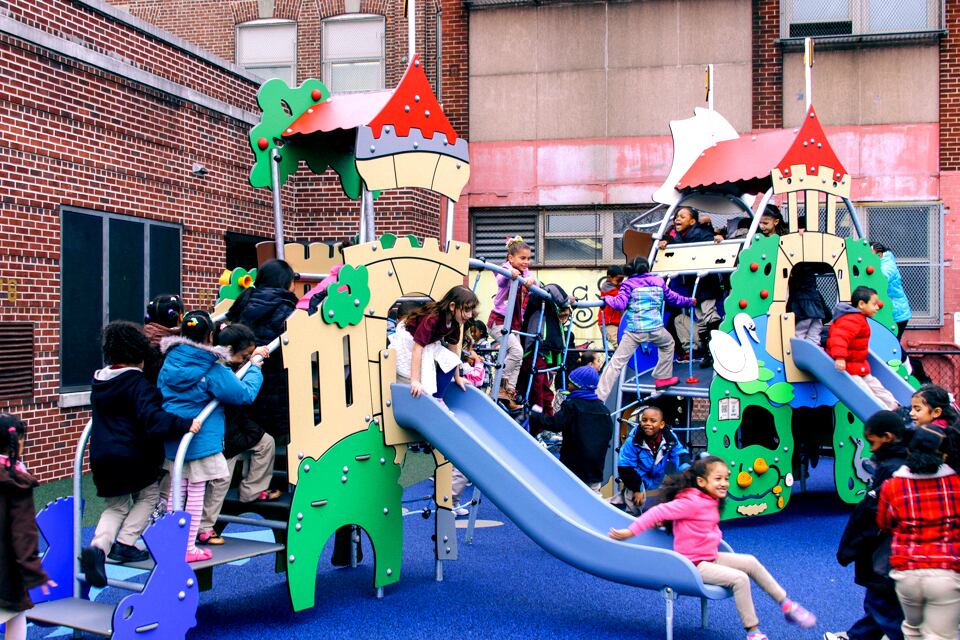Students at Lincoln Elementary School will have a new place to run and play by the end of the year thanks to a new initiative to expand access to green spaces and recreational areas in Newark.
Most of the city’s public schoolyards are covered in asphalt and organizations such as the national nonprofit Trust for Public Land and Newark’s Congregation Ahavas Sholom are partnering with Newark Public Schools to redesign outdoor playgrounds.
Last week, the Newark Board of Education approved a partnership with Trust for Public Land and Ahavas Sholom to design and build a new playground at Lincoln School at no cost to the district.
The roughly $2 million project is funded through the Green Acres Grant Program and the Local Recreation Improvement Grant.
“A park at Lincoln Elementary provides an opportunity for the school and community to benefit from outdoor learning and living spaces,” said Nancy Deering, acting communications director for Newark Public Schools.
Of the 90,000 public schoolyards across the country, less than 1% are green and open to the public after school and on weekends according to data from Trust for Public Land. Concrete and asphalt yards contribute to urban heat islands with their effects most prominent during the warmer months. Newark is one of the nation’s worst heat islands.
Lincoln School, located in the city’s Vailsburg neighborhood in the West Ward, was built in 1916 and expanded during the 1930s as part of the Works Progress Administration projects instituted by President Franklin Roosevelt. Currently, the schoolyard is covered in asphalt with little play equipment.
In Newark, 94% of the population lives within a 10-minute walk of a park, according to Trust for Public Land’s 2022 ParkScore Index, but for the remaining 17,321 people without access to a nearby park, Trust for Public Land is prioritizing the redevelopment of playgrounds in schools such as Lincoln and other outdoor spaces to reduce the gap.
“We believe every student, faculty member, and resident of Newark should have a community schoolyard that supports the social, emotional, and academic development of Newark’s children,” said Scott Dvorak, Trust for Public Land’s New Jersey state director. “We intend to continue our work until we have achieved that goal.”
Construction is set to begin over the summer and fall of this year pending permit approvals and the construction bidding process, according to Dvorak. Once completed, nearly 500 students and school staff, as well as the area’s more than 8,000 residents, will have access to the schoolyard by the end of this year.
According to the agreement between Trust for Public Land and Newark Public Schools, the nonprofit will work with school administrators, teachers, students, the local community, and other stakeholders to design the playground.
In 2015, Trust for Public Land and Ahavas Sholom, helped renovate the Sussex Avenue School schoolyard, which was also covered in asphalt and had one basketball hoop. Students at the school helped design the new space and all grades voted on what they wanted. The new half-acre schoolyard was designed to include a turf field, running track, and a drinking fountain on the playground for the first time. The yard also includes a seating area, fashioned from large granite blocks, that functions as an outdoor classroom.
Historically, communities of color and low-income neighborhoods have less access to green spaces. Previously, Trust for Public Land has helped transform 13 parks and schoolyards in Newark’s highest-need neighborhoods including Newark Riverfront Park, Jesse Allen Park, and Lafayette Street School as well as 200 schoolyards nationwide.
They receive financial support from national and state agencies and other nonprofits.
Jessie Gómez is a reporter for Chalkbeat Newark, covering public education in the city. Contact Jessie at jgomez@chalkbeat.org






